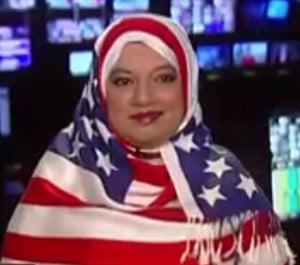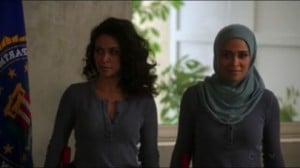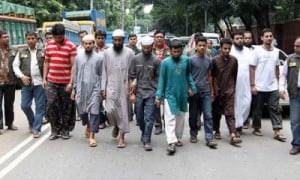It’s been a little while since we last discussed Little Mosque on the Prairie, a Canadian television sitcom about a Muslim community in a small (fictional) town. We’ve written before about its handling of the question of separate mosque entrances for men and women; the character of Sarah, a white Muslim woman; an interview with the actress who plays Rayyan; the reaction to Layla’s crush on a boy at the mosque; and a couple general overviews of the show from back in its earlier days.
Season Four of the show began this fall. Episodes can be seen here (at least, they can in Canada. If the link doesn’t work for you, you should be able to find the episodes on YouTube.) To be honest, I haven’t been especially impressed with most of this season’s episodes, especially given how unbearably obnoxious the new church reverend is. Those of you who’ve been following will probably know what I mean.
However, there has been one moment this season that I really appreciated, and that actually responds to some of the biggest issues that I’ve had with the show up to this point. The five-times-daily prayer is almost never mentioned on Little Mosque, so I was especially annoyed that the one time that it came up was in the context of how hard it would be. On a more general level, the equation of hijab=good Muslim, no hijab=non-practising, bad Muslim is something that has arisen in a lot of our MMW critiques of Little Mosque. Fatima and Rayyan both wear it, and are generally depicted as the ones following Islam, whereas the major characters who don’t wear it (and, in fact, the only Muslim women depicted without it) are Sarah, the clueless white woman, and Layla, the rebellious teenager.

It’s Layla’s character, however, who is becoming more interesting as the show progresses. For the first couple seasons, she seemed there basically as someone for her father, Baber, to attempt to control, and most of what we saw of her were her continued attempts to resist her father’s rules (and who could blame her?), although father and daughter always reconcile in the end. It seemed, for a while, as if Layla’s interactions with Islam were shown only as her transgressions against her father’s very strict religious interpretations: talking to boys, refusing to wear hijab, and so on. It was hard to see whether Layla herself really cared much about being Muslim, because what we saw of her character was so dominated by her rebellion against her father.
I don’t mean to suggest that Layla wouldn’t be an authentic or positive character unless she demonstrates how important Islam is to her identity, but there have been a few recent scenes when she has started to articulate the personal importance that her religion holds for her, and this adds an interesting complexity both to her own character and to the possible range of “Muslim” identities that the show depicts. In one episode last season, Layla’s father bans her from going into the local health food store (despite its delights of alcohol-free vanilla and gelatin-free gummy bears), because he can tell that she likes the boy who works there. Layla is clearly upset with her father and finds him unreasonable; it’s the typical Baber/Layla kind of argument. Where it changes is towards the end, when Baber is outside of the store, and the boy in question goes on a bit of an anti-religion rant. Layla’s disgust at him is apparent, and she emphasizes how important Islam is to her. It’s one of the first instances where Layla articulates her own connection to being Muslim.
In a recent episode this season (and, I think, one of the funniest episodes yet), Layla goes to live with Rayyan for a while because she and her father aren’t getting along. When things don’t start off especially smoothly between Rayyan and Layla, Rayyan says that they need to set down some rules, to which Layla assumes that this begins with Rayyan wanting her to wear hijab.
A conversation follows:
Layla: “No offence, I just don’t get how you deal with it.”
Rayyan: “Wearing hijab is how I choose to show my devotion to God and Islam.”
Layla: “Well, I guess I’m not as ‘devoted’ as you, I just can’t wear it.”
Rayyan: “I’m not saying you’re not devoted.”
Layla: “I don’t drink, I don’t date, I pray five times a day, but it’s never enough for my dad. Or you, I guess.”
Rayyan: “Layla, you’re a great Muslim. It’s not about what’s on your head. It’s about what’s in your heart. […] Don’t worry about what’s good enough for us. It’s between you and God. Just figure out what’s right for you.”
I’m not saying this scene is perfect – defining what makes a “great Muslim” is always problematic, and Layla still defines it here largely in terms of outward actions – but I still think it’s one of the more honest and realistic portrayals that Little Mosque has had of the struggle to balance one’s own religious beliefs and practices with the external pressures that exist. It also puts Rayyan’s choice to wear hijab into context as one, but not the only, way to express a connection to God, and challenges its position as a marker of what makes a good Muslim. And, praying is shown as a regular part of Layla’s life, not as something impossible to take on, as Sarah’s character had suggested a few seasons previous to this one.
This is only one scene, and it does end with Rayyan policing Layla’s interactions with her male friends, so it’s not exactly revolutionizing the whole show. However, I think it’s still important that it’s there, and I hope that Little Mosque will continue to chip away at some of the other simplistic and stereotypical identities that have arisen.
I also hope that the show manages to get rid of the new reverend, but I’m not holding my breath on that one…













